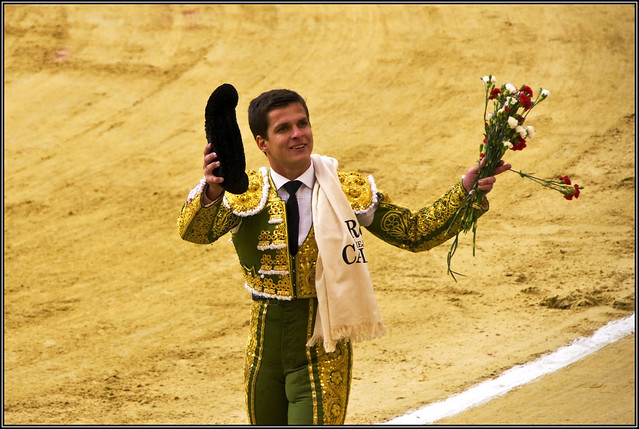Bull Fighting Wiki Details
In the first stage, the tercio de varas ("lances third"), the matador observes how the bull charges as capes are thrust by the banderilleros. He also notes vision problems, unusual head movements, or if the bull favors a part of the ring called a querencia, or territory. A bull trying to reach its querencia is often more dangerous than a bull that is attacking the cape directly. The initial attack by the matador is called suerte de capote ("act of the cape"), and there are a number of fundamental "lances" or passes that matadors make; the most common being the verónica.
Next, two picadores enter the arena, each armed with a lance or vara. The picadores are mounted on large heavily padded and blindfolded horses. The bull is encouraged to attack the horse which is protected by its padding and appears to treat the attack with stoic patience. The picador stabs a mound of muscle (morrillo) on the bull's neck leading to the animal's first loss of blood. This loss of blood further weakens the bull and makes him ready for the next stage. Padded protection for the horses was mandated relatively recently in history and up to the 1930s the horses were gored and killed by the bull in the ring.
As the picador stabs the top of the bull with the lance, the bull charges and attempts to lift the picador’s horse with its neck muscles. This causes further weakening of the neck. If the picador does his job well, the bull will hold its head and horns lower during the following stages of the fight. This makes him slightly less dangerous while enabling the matador to perform the passes of modern bullfighting.
In the first stage, the tercio de varas ("lances third"), the matador observes how the bull charges as capes are thrust by the banderilleros. He also notes vision problems, unusual head movements, or if the bull favors a part of the ring called a querencia, or territory. A bull trying to reach its querencia is often more dangerous than a bull that is attacking the cape directly. The initial attack by the matador is called suerte de capote ("act of the cape"), and there are a number of fundamental "lances" or passes that matadors make; the most common being the verónica.
Next, two picadores enter the arena, each armed with a lance or vara. The picadores are mounted on large heavily padded and blindfolded horses. The bull is encouraged to attack the horse which is protected by its padding and appears to treat the attack with stoic patience. The picador stabs a mound of muscle (morrillo) on the bull's neck leading to the animal's first loss of blood. This loss of blood further weakens the bull and makes him ready for the next stage. Padded protection for the horses was mandated relatively recently in history and up to the 1930s the horses were gored and killed by the bull in the ring.
As the picador stabs the top of the bull with the lance, the bull charges and attempts to lift the picador’s horse with its neck muscles. This causes further weakening of the neck. If the picador does his job well, the bull will hold its head and horns lower during the following stages of the fight. This makes him slightly less dangerous while enabling the matador to perform the passes of modern bullfighting.
Bull Fighting Wiki
Bull Fighting Wiki
Bull Fighting Wiki
Bull Fighting Wiki
Bull Fighting Wiki
Bull Fighting Wiki
Bull Fighting Wiki
Bull Fighting Wiki
Bull Fighting Wiki
Bull Fighting Wiki
Bull Fighting Wiki
Bull Fighting Wiki





_01.jpg)
_02.jpg)
_03.jpg)




No comments:
Post a Comment